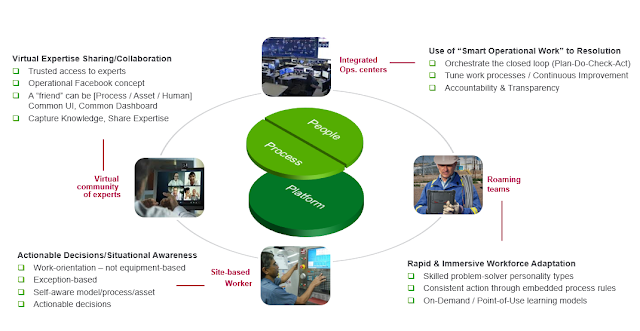We often hear of the aging workforce as a big problem, and
certainly it is due to fact that it is not a evolutionary transition to next generation of workers it is leap to new generation of workers missing at least one generation. So from "baby boomers" to Gen Y or Millennials.
As has been stated many times comes with this a change in "Experience levels" of the job, and site, but correspondingly comes a change in the way they native work, engage with others sharing more, asking more, providing the opportunity to bridge this experience transition.
Last week in some discussions around Integrated Operational Centers (IOC) it was clear that IOC is not about bringing what happens field control rooms into a central location, the real transformation happens when experience and operational work transformation happens. Shifting to an operational experience where:
- Experience can be shared across sites, and workers through standard operational interfaces and experiences
- Shift to Exception based experience from monitoring, where the user interacts with the system only when required.
- Where planners, operational control, and subject matter experts can align, and collaborate in real-time, sharing the same view on a situation.
But it was clear that the companies making the big step are going further, and really introducing the "Flexible Operational Team " concept, shifting from an operator to a true operational team. From site workers who now are agents (eyes) to the rest of the team on site, to central control working closely with real-time planning and work order execution, to experts in maintenance, process, safety, and management providing the real-time knowledge and experience across multiple sites, and multiple situations. The diagram below shows this "flexible operational team" and the associated transformation in operational work across the team, due to new work ethic of sharing and asking.
But what we seeing in the market is some innovative
approaches to solving this existing experiencing and the transfer, and it is
through the use of “Virtual Experts Teams”. So what is this concept?
Key is to have these highly valued knowledge experts which
could be across different aspects of the business e.g. asset management,
process, planning, optimization, quality being empowered to work across the
many enterprise production assets/plants. Today many of these experts are
restricted in their contribution to their local plants, but a number of
companies have started strategies which say we must leverage these people.
These experts must be able to access the state, information of the plants in a
consistent manner even though they may have never been there. They must also
have the natural ability to collaborate with the local teams.
This means a local team is able to call upon the best
experts relative to the situation they are dealing with. The expert is able to
go online and access the plant situation in “near real-time” so they can see
the situation while collaborating with the site team. They are able to drill in
and do analysis, so as to draw upon experience and provide advice in real-time
to the local team.
Now is this easy, I would say no, as just accessing the
plant data is not effective, as the expert maybe over the other side of the
world, never been to the plant and so the data will be in different measures/
context to what he expects. So in order to achieve this virtual team we need to
have a “trusted information” system, where the data / information is a
consistent context.
But the above concept is real, and is valid with leading
companies currently implementing these "virtual communities" with subject matter experts on call across sites and situations. The operational team experience is not a "rip and replace" it is built on the existing automation/ supervisory systems installed in 90s, and 2000s, but now aligned with a validated model, and context. Plus a collaboration user experience where systems notify of "abnormal situations" and the controllers will share and collaborate in real-time, and virtual experts can access their view of the situation in real-time. Note the view of the expert may be different angle on the data relative to their expertise,
But the system is NOT a one way information system, it is bidirectional, interactive experience with accountability, of action and role, with a built in ability to evolve the knowledge and experience of the system for the future.
Too often I am seeing slices of this Operational Team landscape, being implemented without realizing the whole picture to realize the paradigm shift in value.



No comments:
Post a Comment